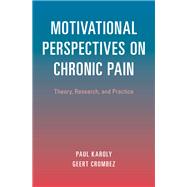Motivational Perspectives on Chronic Pain is one of the first volumes to present a cohesive account of the adaptation to chronic pain from a motivational perspective. Contributing authors from diverse areas of pain research offer comprehensive summaries of the concepts, findings, and applied methodologies that converge on the role of goals and goal-related cognitive processes, self-regulatory support mechanisms, contextual forces, and emotionality as they influence (and are influenced by) the experience of chronic pain.
This volume provides readers with an up-to-date compendium of cutting-edge research and interventions that collectively illustrate the utility of viewing chronic pain neither as a "disease" nor an imposed lifestyle, but as the emergent and potentially flexible product of a complex transactional system that is bounded by both sociocultural factors and by biogenetic and neural moderating forces. Within its pages, chapters capture the vibrancy of current theory, research, and practice while pointing toward unexplored new directions. Among the important topics addressed by this distinguished group of authors include: the nature and relevance of control systems, the role of neural mechanisms on pain processing, the influence positive and negative emotion regulation play on pain management, the impact of learning and conditioning, and the often neglected influence of interpersonal processes on adjustment to chronic pain.








